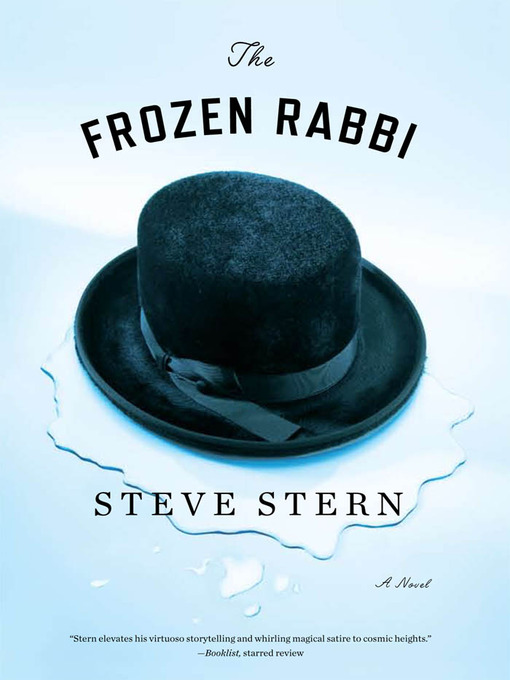
The Frozen Rabbi
کتاب های مرتبط
- اطلاعات
- نقد و بررسی
- دیدگاه کاربران
نقد و بررسی

February 1, 2010
A family of long-suffering eastern European Jews protects a frozen rabbi from pogroms, revolution, and racketeers in this intermittently fabulous multigenerational saga. Stern (The Angel of Forgetfulness
) uses two narrative threads, one beginning in 1999 when 15-year-old Bernie Karp discovers a body in his family's freezer, the other beginning in 1889 when the rabbi is frozen during a winter storm. With a ferocious grasp of history and Yiddish humor, Stern follows the family of misfits and geniuses as they flee the Lodz ghetto in Poland with their icy cargo, eventually making their way to New York, Palestine, and Memphis, where, in 1999, the rabbi reawakens. Unfortunately, the brilliant Chagall-like eye Stern turns toward the first half of the 20th century is bleary when it glances at the recent past, in which the story concerns itself more with Bernie's inability to lose his virginity and the newly thawed holy man's lecherous and tedious determination to enjoy 1999, which he considers to be heaven on earth. Stern ties both narratives together neatly, but the remarkable characters who cart the frozen rabbi through such vividly realized hells on earth deserve a bolder legacy than the banal one they get.

March 1, 2010
Yes, this is indeed a novel about a frozen rabbi who thaws in the late 20th century after being found by Bernie Karp, of Memphis, Tenn., in his parents' freezer.
Stern (The Angel of Forgetfulness, 2005, etc.) uses his absurdist fantasy to explore issues of faith, secularism and redemption. Bernie, in particular, is in need of the latter, for he's a 15-year-old couch potato with no interest in or regard for his religious heritage. While the novel starts with the recovery of Rabbi Eliezer ben Zephyr from the deep freeze (Bernie's father explains to his bewildered son that"they handed [the rabbi] down from generation to generation"), Stern alternates chapters chronologically, beginning in 1889 when the rabbi, a noted holy man in Tsarist Russia, would meditate by a pond in order to get closer to God. One day a storm came, the water rose, the rabbi continued to meditate and winter eventually arrived, resulting in his being encased in ice. From that point we trace both the history of the Karp family's interaction with the frozen rabbi (in the early 20th century it helped that an earlier Karp had owned a large ice factory) and Bernie's spiritual transformation as a result of his interactions with the Chasidic sage. Bernie begins to lose weight, to have out-of-body experiences and to become intellectually invested in obscure Jewish mystical texts. Meanwhile, the rabbi becomes fascinated with and impressed by life around the year 2000:"Shopping bazaars it's got, and Dodge Barracudos and Gootchie bags made I think from the skin of Leviathan…but it ain't got a soul." The rabbi makes a radical attempt to ingest soul into this culture by establishing a"House of Enlightenment" in a strip mall in Memphis. As Bernie's fortunes begin to rise—he even acquires a"trailer trashy" girlfriend sympathetic to his needs—so do the rabbi's decline, resulting in a tragicomic conclusion.
An ethnic novel with universal implications.
(COPYRIGHT (2010) KIRKUS REVIEWS/NIELSEN BUSINESS MEDIA, INC. ALL RIGHTS RESERVED.)

June 15, 2010
This epic tells the story of Polish rabbi Eliezer ben Zephyr, who's prone to episodes of spiritual disembodiment. In a freak storm in 1889, his body is flash-frozen while his soul is absent. His body is encased in ice and handed down through the generations as a family heirloom, until another freak storm causes a power outage, and he awakens in 1999 Memphis. There he proceeds to gain a cult following based on the tenet that people in the here and now already experience paradise. National Jewish Book Award winner Stern (The Wedding Jester) deftly explores the Jewish immigrant journey from 1890 to the present, ranging from pogroms to the transatlantic crossing to life on Manhattan's bustling Lower East Side.
Verdict Stern's combination of fact, myth, and flights of imagination make this a fascinating read. Those who enjoy ethnic fiction with a touch of the absurd will enjoy this book.--Joanna M. Burkhardt, Ashaway, RI
Copyright 2010 Library Journal, LLC Used with permission.

Starred review from March 15, 2010
Sterns uproarious and trouncing romp through the anguish and ironies of the Jewish diaspora matches mysticism with mayhem, beatitude with organized crime, creativity with crassness. The madcap, at times, surreal action revolves around Rabbi Eliezer ben Zephyr, whose out-of-body journeys to the realm of the divine result in his being frozen in a block of ice in the Jewish Pale in 1889, a frigid relic that becomes one familys problematic inheritance. In scenes of vivid drama and burlesque comedy on the same epic scale as Sterns Angel of Forgetfulness (2005), the rabbi-on-ice is transported through a pogrom and across the Atlantic under the guardianship of a raven-haired woman protectively disguised as a man, who finds sanctuary with the sweet-natured, hunchbacked inventor Shmerl Karp in the roiling Lower East Side. Finally, in 1999, the great thaw brings the reanimated rabbi and misfit teen Bernie Karp together in a suburb of Memphis, Tennessee, where the holy man, enthralled by Americas TV-stoked capitalism, opens his profitable and controversial House of Enlightenment. Stern elevates his virtuoso storytelling and whirling magical satire to cosmic heights in this lovingly irreverent and revelatory novel of the timeless conflict between the sacred and the profane, and the perpetual search for home and meaning.(Reprinted with permission of Booklist, copyright 2010, American Library Association.)

























دیدگاه کاربران